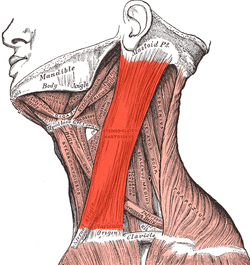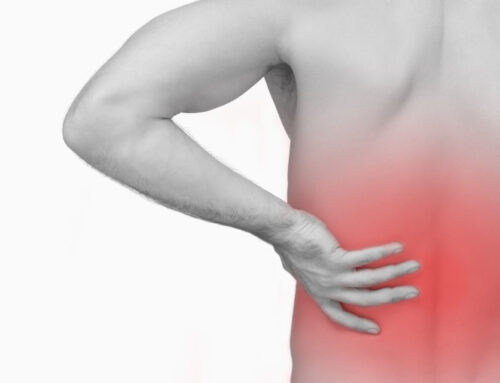The three systems that contribute to healthy balance=
1. Vision
2. Proprioception (that’s the fancy medical term for the body’s awareness of it’s position in space)
3. Vestibular system i.e. “the inner ear”.
The vestibular system can be off kilter for several reasons. The most common is that the “salts” (otoliths) are out of alignment (think about the bubble in a level and that it should always be in the center.) This cause of dizziness can be fixed with a visit to your friendly ENT or physical therapist who is trained in vestibular rehab (at Premier, that would be Curt Krobot, DPT).
A less common and frequently overlooked cause of dizziness is due to tightness/ trigger points in the sternocleidomastoid (SCM) muscle. As you can see in the picture, the SCM connects right next to the inner ear. Trigger points at the left SCM will give faulty input to the left vestibular system, which will cause the right vestibular system to become dominant. Whenever there is an imbalance between the vestibular systems, the person will feel dizzy and/or may walk with a tendency to always veer to the dominant side.
Why Am I Dizzy? Common Causes of Vertigo
In addition to the aforementioned causes, there are several other factors that can contribute to dizziness or vertigo. These include:
- Multiple sclerosis: Individuals with multiple sclerosis may experience dizziness as a symptom of their condition.
- Operating heavy machinery: Dizziness can be dangerous, especially when operating heavy machinery, as it can impair coordination and concentration.
- Motion sickness: Certain individuals are more prone to motion sickness, which can cause dizziness and nausea when exposed to specific movements or transportation methods.
- Sudden drop in blood pressure: A sudden decrease in blood pressure can lead to lightheadedness and dizziness.
- Head injury: Traumatic head injuries can disrupt the vestibular system and cause dizziness.
- Vestibular neuritis: This condition involves inflammation of the vestibular nerve, leading to dizziness and loss of balance.
- Taking a seated or lying position: Some people may experience a sense of spinning or movement when they sit or lie down, which can be attributed to positional vertigo.
- Moving your head: Rapid or sudden head movements can trigger dizziness in susceptible individuals.
- Various medical conditions: Certain medical conditions, such as ear infections, hearing loss, and episodes of dizziness, can contribute to feelings of dizziness.
- Blood sugar levels: Fluctuations in blood sugar levels, particularly low blood sugar (hypoglycemia), can cause dizziness.
- Benign paroxysmal positional vertigo (BPPV): BPPV is a common form of vertigo caused by small crystals in the inner ear, leading to brief episodes of dizziness triggered by head movements.
- Blood flow: Impaired blood flow to the brain, often due to circulatory problems or vascular disorders, can result in dizziness.
By considering these various factors and addressing potential causes, you can take steps towards understanding and managing your dizziness effectively. Remember, if you’re experiencing persistent or severe dizziness, it’s crucial to consult a healthcare professional for an accurate diagnosis and appropriate treatment.
Learn more: Vestibular Rehab for Vertigo
Physical Therapy Can Help
Bottom line: if you have dizziness and/or walk crooked (not on purpose), have a physical therapist check your SCM muscles- they may need stretching and/or dry needling. Don’t just take my word for it- check out some of the literature…
http://www.ncbi.nlm.nih.gov/pubmed/17182355
http://www.ncbi.nlm.nih.gov/pmc/articles/PMC1769463/
http://www.minnesotamedicine.com/PastIssues/PastIssues2010/May2010/ClinicalHubbardMay2010.aspx







